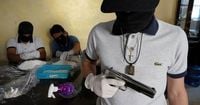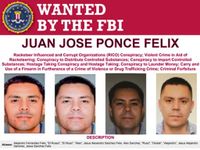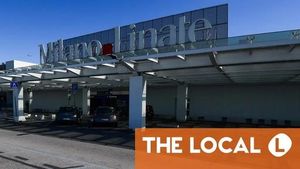The United States Treasury Department has unleashed a sweeping round of sanctions targeting Los Mayos, a notorious faction of the Sinaloa Cartel, and a network of individuals and companies tied to the group’s criminal enterprise. The move, announced on September 18, 2025, is part of a renewed cross-border crackdown on drug trafficking, money laundering, and official corruption that has plagued both sides of the U.S.-Mexico boundary for years.
According to Sin Embargo, the U.S. Treasury’s Office of Foreign Assets Control (OFAC) designated five individuals and 15 companies linked to Los Mayos and its allies, freezing their assets and effectively barring legitimate businesses from working with them. The sanctions, which came on the heels of a visit by Under Secretary of the Treasury for Terrorism and Financial Intelligence John K. Hurley to the border, aim to disrupt the financial underpinnings of one of the hemisphere’s most powerful and violent criminal syndicates.
“The Sinaloa Cartel is a foreign terrorist organization that continues to traffic narcotics, launder its profits, and corrupt local officials,” Hurley declared, underscoring the Trump administration’s commitment to stemming cross-border threats. As Border Report noted, these measures are not merely symbolic; they freeze known assets, prohibit U.S. persons and companies from any dealings with designated parties, and carry the threat of substantial civil and criminal penalties for violators.
The impact was felt immediately in Mexico as well. The Financial Intelligence Unit (UIF) of Mexico’s Ministry of Finance and Public Credit (SHCP) announced an “administrative freeze” on accounts linked to the sanctioned individuals and entities. Among those affected is Morena Deputy Hilda Araceli Brown Figueredo, who served as Mayor of Rosarito, Baja California, from 2021 to 2024. The UIF clarified, “The possible inclusion on the Blocked Persons List is a preventive measure, not a judicial determination, and does not prejudge the existence of criminal liability without evidence.” Still, the agency is analyzing financial data and will notify the Attorney General’s Office if it finds signs of illicit activity.
Los Mayos, identified as a rival faction to “Los Chapitos” (the sons of Joaquín “El Chapo” Guzmán Loera), have long maintained a stranglehold over the Mexican states of Baja California, Sonora, and Zacatecas. The group traffics deadly drugs—fentanyl, methamphetamine, heroin, marijuana, and cocaine—northward into the United States, according to the U.S. Treasury. But their criminal reach doesn’t end there. In Rosarito, they are accused of orchestrating kidnappings, extortion, money laundering, and corrupting local government officials—a toxic mix that has turned the coastal city into a key artery for cartel operations.
Rosarito’s proximity to the U.S. border makes it a strategic hub. U.S. authorities allege that Los Mayos’ dominance in the area is enforced by a potent mix of violence and political manipulation. The Treasury Department’s announcement detailed how the group’s northern Baja California operations are overseen by Alfonso and René Arzate García, known as the Arzate brothers. Working alongside them is Jesús González Lomelí, a business magnate who owns a string of bars and restaurants, including Bombay Beach Club and Mariscos El Caimán. González, it is alleged, has laundered millions in drug proceeds for the Arzate brothers and other senior cartel figures.
The cartel’s influence, however, seeps beyond the business sector and into the corridors of political power. Candelario Arcega Aguirre, described as a political operative affiliated with the Sinaloa Cartel, used his close relationship with Brown Figueredo to sway the Rosarito municipal government. According to the U.S. Treasury, Arcega “was able to control parts of the municipal government and appoint his allies to high-level positions.” During Brown’s mayoral tenure, González and Arcega acted as intermediaries between her and the Arzate brothers, collecting extortion payments and shielding cartel activities from law enforcement scrutiny.
The U.S. Treasury’s statement is unambiguous: “González, Arcega, and Brown are being designated pursuant to Executive Order 14059 and Executive Order 13224, as amended, for having acted or purported to act for or on behalf of the Sinaloa Cartel, directly or indirectly.” Fourteen companies owned by González and a transportation firm run by Arcega are also swept up in the sanctions net.
Los Mayos’ criminal muscle is enforced by notorious figures like Juan José Ponce Félix, known as “El Ruso.” Identified as the leader of the group’s main armed wing, El Ruso controls drug trafficking routes in Baja California and commands a “fleet of soldiers” engaged in kidnapping, torture, and murder. On September 16, 2025, the U.S. State Department announced a reward of up to $5 million for information leading to his arrest or conviction. The U.S. District Court for the Southern District of California has indicted him on conspiracy and other charges, detailing his violent methods in support of the cartel’s interests.
Another key player, Carlos Alberto Páez Pereda (“Carlitos”), leads the “Los Rugrats” gang in Laguna Colorada, Sinaloa. Páez is described as a fentanyl producer and a principal trafficker in Culiacán, known for carrying out murders and attempted murders on cartel orders. The Treasury’s action against Páez and his associates further underscores the U.S. government’s determination to disrupt the operational and financial infrastructure of the Sinaloa Cartel’s most dangerous factions.
The roots of this latest crackdown trace back to a dramatic shift in the cartel’s internal dynamics. In July 2024, the Sinaloa Cartel splintered after Joaquín Guzmán López betrayed Ismael “El Mayo” Zambada García, delivering him to U.S. authorities—a move that remains shrouded in secrecy and has not been fully disclosed by the Trump administration. The resulting power struggle between Los Mayos and Los Chapitos has left a trail of blood, with more than 1,000 deaths in Sinaloa alone, according to U.S. officials. Security experts cited by Border Report put the toll even higher, with 1,800 dead and 800 missing over the past year.
The sanctions carry significant teeth. As OFAC explained, “All property and interests in property of the designated or blocked persons described above, located in the United States or in the possession or control of U.S. persons, are blocked and must be reported to OFAC.” Any entity owned 50 percent or more by one or more blocked persons is also covered. Transactions involving these parties are generally prohibited, and violators—whether U.S. citizens or foreign nationals—risk civil or criminal penalties. Financial institutions and others engaging with designated persons may themselves be exposed to sanctions, making the stakes for compliance especially high.
While the designation of individuals and companies is a preventive measure rather than a criminal conviction, the message from both Washington and Mexico City is clear: cross-border criminal operations that exploit violence, corruption, and illicit finance will face coordinated, escalating pressure from both governments. The coming months will reveal just how much these measures can disrupt the entrenched power of Los Mayos and their associates.
As the battle for control over the Sinaloa Cartel’s legacy rages on, the reach of U.S. sanctions and Mexico’s financial intelligence efforts may yet prove a decisive factor in the shifting landscape of organized crime along the border.





